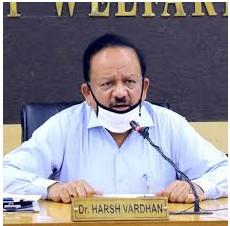Principles of resilience must be integral to our quest for economic growth as individual nations and the international community: Dr. Harsh Vardhan
We must forge a global dialogue and chart directions for a resilient future for humanity at large”, said Dr. Harsh Vardhan, Union Minister for Health and Family Welfare, while virtually addressing an event by Coalition for Disaster Resilient Infrastructure (CDRI) and UN Office for Disaster Risk Reduction (UNDRR).

The theme of the event was “Build Back Better: building resilient health infrastructure and supply chains” where Dr Vardhan appreciated the UN Office for Disaster Risk Reduction and the Coalition for Disaster Resilient Infrastructure for organizing the webinar with a perspective to look forward on how to make health infrastructure and supply chains more resilient.
Dr Vardhan said, “It has been almost one year since the outbreak of COVID-19. While the caseload infection in many parts of the world is decreasing, many others are experiencing a second or even a third peak. Fortunately, in India, the cases are steadily coming down. We recognized the threat early and pursued a scientific evidence based approach.”
Speaking on the COVID trajectory in India and bringing to light the steps taken by India to deal with the pandemic, Dr Vardhan said, “Our first step was to expand our present capacities swiftly, whether it was for testing, PPE production, or hospital beds. We looked at the problem in greater granularity and scaled up at an incredible pace.”
He added, “We also repurposed our capacities from multiple research disciplines across a wide range of public and private institutions. We repurposed defense research capacities for quickly erecting hospitals with enhanced capacity. From being an importer of PPEs before the pandemic, India is now a net exporter of PPEs. We scaled up our testing capacity from a few hundred tests per day to a million tests per day. The nimbleness that the Indian research institutions have shown needs to be not only preserved but also encouraged.”
Detailing the importance of effective communication to overcome the humanitarian crisis, Dr. Harsh Vardhan noted, “We have used every possible means to mobilize everyone. The Prime Minister himself has led this effort and addressed the citizens directly. He has also emphasized the spirit of cooperative federalism, wherein the state and central governments worked hand in hand at each stage.”
He added, “Apart from this, we recognized early that while the health sector has to be at the forefront of combating COVID-19, it requires involvement of all of the government functions – disaster management, industry, civil aviation, shipping, pharmaceuticals, and environment and so on. We innovated early on to establish an institutional platform in the form of “empowered groups” to bring together these multi-sectoral functions in a cohesive manner.”
Dr Vardhan said, “I believe that some of the good practices that have been developed in many countries of the world during the pandemic need to be institutionalized. We do not need to reinvent these in the future. At the same time, we have to think about how we could have done this better. We need a deeper conversation about what “building back better” in the context of public health infrastructure would mean! How do we combine modern science with traditional wisdom? How do we define “health infrastructure”? Is it only the big hospitals, district hospitals and primary health care centers? Or is it the whole system involving other sectors including, water and sanitation, social welfare, transport, and industry? These are important issues that get thrown up and need revaluation.”
Emphasizing on disaster resilience as an essential area of global common interest, he stated, “Over the past decades, India and nations of the world have seen unprecedented progress in economic and human development. However, as COVID-19 has shown, all of this notable progress is at risk if we do not make our systems resilient. The key lesson from the pandemic is that the principles of resilience must be integral to our quest for economic growth as individual nations and the international community. Our lives and livelihoods may very well depend on it. In doing so, we have to make our systems resilient to not only pandemics but all types of risks, including those emerging from the effects of climate change.”
Concluding the speech, he said, “We must forge a global dialogue and chart directions for a resilient future for humanity at large. This would be the most worthy tribute to our people – particularly health workers, emergency responders, frontline workers – who have put the world’s safety before their own personal safety.
